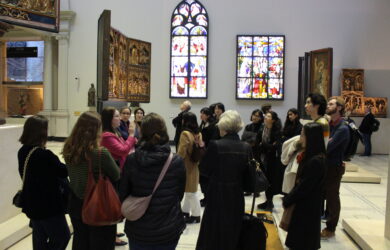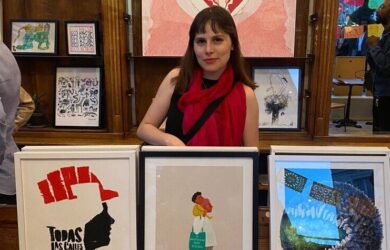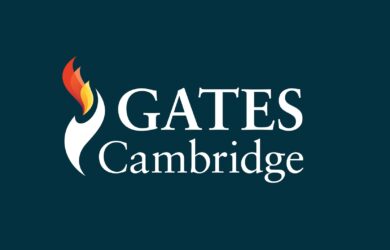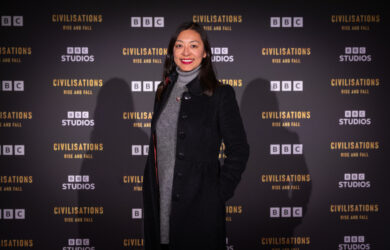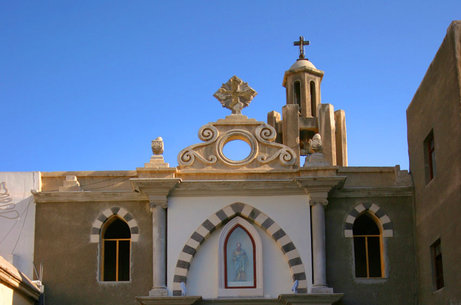
Tala Jarjour did her PhD on sacred Christian music in the Middle East and is now writing a book cataloguing a tradition whose survival is in danger.
When Tala Jarjour was thinking about a topic for her PhD on sacred Christian music in the Middle East she spoke to a bishop about where she should focus her research. He suggested the church in Mosul, his home church. Mosul had a good music tradition which had not been studied much. The Iraq War was imminent, however, so she chose instead to study the bishop’s church in Aleppo.
The church of Mosul does not exist anymore and the bishop Tala spoke to was abducted about a year and a half ago. Nothing has been heard since.
In Aleppo the situation is perilous. The church had a very special reputation and history. It is one of the oldest locations where Syrian Christianity developed and its community emigrated from Turkey after World War One. “The chant is one of the most historically and musically distinctive of the Syrian Orthodox tradition,” says Tala, who is writing a book on the subject which is all the more difficult and all the more important in the face of current circumstances. She feels she is cataloguing a tradition that may not be the same for long.
Tala [2005] says that the Christian tradition in Syria has been in slow decline for centuries. She published a very early paper about chant as a ‘narrative of survival’. “At the time I could not have predicted or have imagined that by the time I finished my PhD this small community would be concerned about its very survival,” she says. “The presence of Christians in the Middle East is facing new and increasing threats, so are many forms of diversity in the region.”
Childhood
Tala grew up in Damascus. From eight years old she played violin. She was taught at a music school where the focus was on performance and many of her teachers were high level Russian musicians. When she got older she discovered that one of her teachers was a world famous violinist. “Our Russian teachers gave us a special and quite serious outlook on music,” says Tala.
After high school she got accepted to study electrical engineering at the University of Damascus and to study music at the Conservatoire. She decided to opt for both although they were at opposite ends of the city. However, neither recognised the other which made life difficult. If, for instance, Tala had an engineering exam her orchestra conductor would joke that she was studying to fix the sewage system. In the end it became logistically impossible and she took a year out of engineering in her second year. She felt music was the more difficult but the more meaningful choice for her, although it was risky in terms of a career afterwards. “I felt at the time that music connected more deeply with who we are as human beings in a way that electronics did not,” says Tala.
After she graduated, she took a year to find the funding to continue her studies in music and religion abroad. She played with the Syrian National Symphony Orchestra and taught violin at the school where she had studied as a child. She also did voluntary work with church and with a charity called L’Arche (The Arc) which supported people with special needs. Tala taught music at The Arc. “This wonderful experience has shown me how music is a deeply shared human thing and such a natural reflection of social equality. We were in a society where people with disabilities were kept out of sight, but The Arc celebrated their creativity,” she says.
In the end she was funded by the International Leadership Development programme of the Presbyterian Church (USA) to study violin in France. Tala said this was unusual, particularly since she was not studying sacred music and since the violin is not a traditional church instrument. From there she was offered a full scholarship to do a Masters degree at Ohio University. Her history professor was a scholar in western chant music. Tala had always played western music. He encouraged her to study something closer to home and she began to develop a deeper interest in her ancient Christian heritage.
Tala’s family is Christian and has its roots in the Syrian Orthodox tradition, which is one of the older denominations in the region. Her grandfather became an evangelist and followed a different tradition and his interest in the church meant Tala grew up with an awareness of theology. Her Masters thesis was on eight particular chants from the Syrian Orthodox Church.
Syriac chant
After finishing her studies, Tala travelled back to Syria in 2002 where she taught the history of western music at the Conservatoire and violin. She played once again with the National Symphony Orchestra, headed the Conservatoire’s strings department and developed a church music ministry before she moved to London. After studying theory for a year at SOAS, she won a joint Chevening Arab-British Chamber Cambridge Scholarship to do an MPhil at Cambridge and from there applied to do a PhD on Syriac chant, a tradition which has been passed orally for around 2,000 years. She says: “The words have been written down in manuscripts so the hymns may be studied from a textual and historical point of view, but studying the music is a different story since this is an oral tradition. I had to figure out a method and the work had to be interdisciplinary,” she says. “I was interested in how music and social practice connected with theology and religious belief.”
Tala received her PhD in 2011 when she was teaching at New York University and helping to set up a music studies course at NYU’s Abu Dhabi campus, a new degree-awarding university in the Middle East. She was then offered a tenure-track position at Notre Dame University where she is setting up ethnomusicology courses. She also teaches on the new sacred music programmes there and works across music and anthropology. She gives lectures and talks internationally about her work on music and religion and about sacred music in Syria. She is often consulted on academic and artistic affairs in the Middle East. “Ethnomusicology offers good ways for exploring the richness of sacred music in the Middle East,” she says. “It helps me understand the interaction between history, religion and popular culture on the one hand, and politics and global affairs on the other hand, which is quite complex.”
“In Syria the threat that certain sacred musical traditions have been facing for centuries is being condensed into a handful of years,” she says. “I have always believed that such traditions will survive, that people who have carried them for so long will find ways to continue to do so. Conflict and devastation are not new to the history of the region, but there are now so few Christians that they are most easily affected.”
Picture credit: Christian Church, Aleppo. James Gordon, Wiki Commons.








